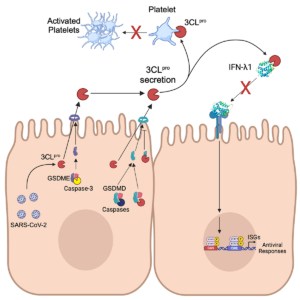Menu
- home
- About
- Our People keyboard_arrow_down
- Sustainability @ LSI
- Respect, Diversity, Equity & Inclusion
- Health, Safety, & Wellness
- Support Us
- Careers
- Core Facilities & Services
- Core Scientific Facilities
- Bioinformatics
- Biofactorial
- UBC GnotoCore
- LSI Imaging
- Proteomics & Metabolomics
- ubcFLOW
- ubcCyTOF
- ASTRID
- Core Support Services keyboard_arrow_down
- Room Booking keyboard_arrow_down
- Additional Resources keyboard_arrow_down
- Core Scientific Facilities
- Research & Training
- Our Labs
- Training at the LSI keyboard_arrow_down
- LSI Pub Corner
- Biological Resilience Initiative
- Partnerships
- Emerging Opportunities keyboard_arrow_down
- Collaborative Research
- Resources for Entrepreneurs
- News & Events keyboard_arrow_down
Login
personDr. Elizabeth Rideout wins 2022 End Diabetes research award
January 17, 2023
Diabetes Canada has announced $9M in funding for 30 new research projects focusing on new developments in diabetes management, care, and risk-reduction.
Dr. Elizabeth Rideout, an associate professor in the Department of Cellular and Physiological Sciences will receive support for a project focused on understanding why women are protected from type 2 diabetes more so than men.
Diabetes Canada Project Description
In healthy individuals, blood sugars are controlled by a hormone called insulin, which lowers blood sugar levels. Insulin is produced in the pancreas by cells called beta cells. For people with type 2 diabetes, they can no longer produce or use enough insulin to control their blood sugars, which can lead to health complications such as nerve damage, blindness, heart disease, kidney failure, anxiety, amputations, and even death.
Type 2 diabetes is caused by several different risk factors, and accounts for 90% of diabetes cases in Canada. We know that whether an individual is male or female affects diabetes risk: adult men are 40% more likely to develop type 2 diabetes than women. We don’t know why.
Dr. Elizabeth Rideout, through the support of Diabetes Canada, is increasing our understanding of why women are protected from diabetes more so than men. Her initial studies in humans and mice show that male and female beta cells are different – beta cells in women survive stress better than beta cells in men, and are better at making insulin in stressful conditions than men’s beta cells.
Beta cell stress is linked with multiple forms of diabetes. Dr. Rideout will determine whether better stress management may be the reason women are better protected from type 2 diabetes. She will identify which pathways and cellular strategies women’s beta cells use during times of stress to maintain the body’s insulin levels. With more clues into how female beta cells respond to stress, scientists can develop better treatments to relieve beta cell stress, improve insulin production, and better manage diabetes in both women and men.
Latest News

PacTB 2025: May 12 – 13
May 2, 2025

LSI PIs Sarah Hedtrich and Arun John Peter named Canada Research Chairs
March 28, 2025

Dr. Emilia Lim Named Dr. Victor Ling Terry Fox New Investigator
February 27, 2025

Unconventional secretion of the SARS-CoV-2 main protease opens the door for new extracellular biology in viral infection
February 11, 2025

LSI researchers awarded funding in Fall 2024 CIHR Project Grant competition
January 30, 2025

UBC evolutionary ecologist and LSI PI, Dr. Kayla King, awarded Arthur B. McDonald fellowship
November 21, 2024

UBC iGEM Team Wins Top Awards for Novel DNA-Based Data Storage Platform
November 13, 2024

Congratulations to LSI PIs receiving 2024 MSHRBC Scholar Awards!
October 1, 2024

LSI researchers awarded funding through Spring 2024 CIHR Project Grant competition
July 24, 2024

LSI researchers awarded over $9.3 million in CFI infrastructure funding
March 25, 2024

LSI Postdoctoral Researchers awarded the CIHR REDI Early Career Transition Award
March 12, 2024

Pioneering technology to simulate blood vessel networks in organ-on-chip models
February 29, 2024

5th Annual Canadian Metabolomics Conference: Integrating Metabolomics with Other Omics
February 28, 2024

LSI researchers awarded funding through Fall 2023 CIHR Project Grant competition
February 6, 2024

CBR/LSI Summer Studentship Program 2024
January 23, 2024